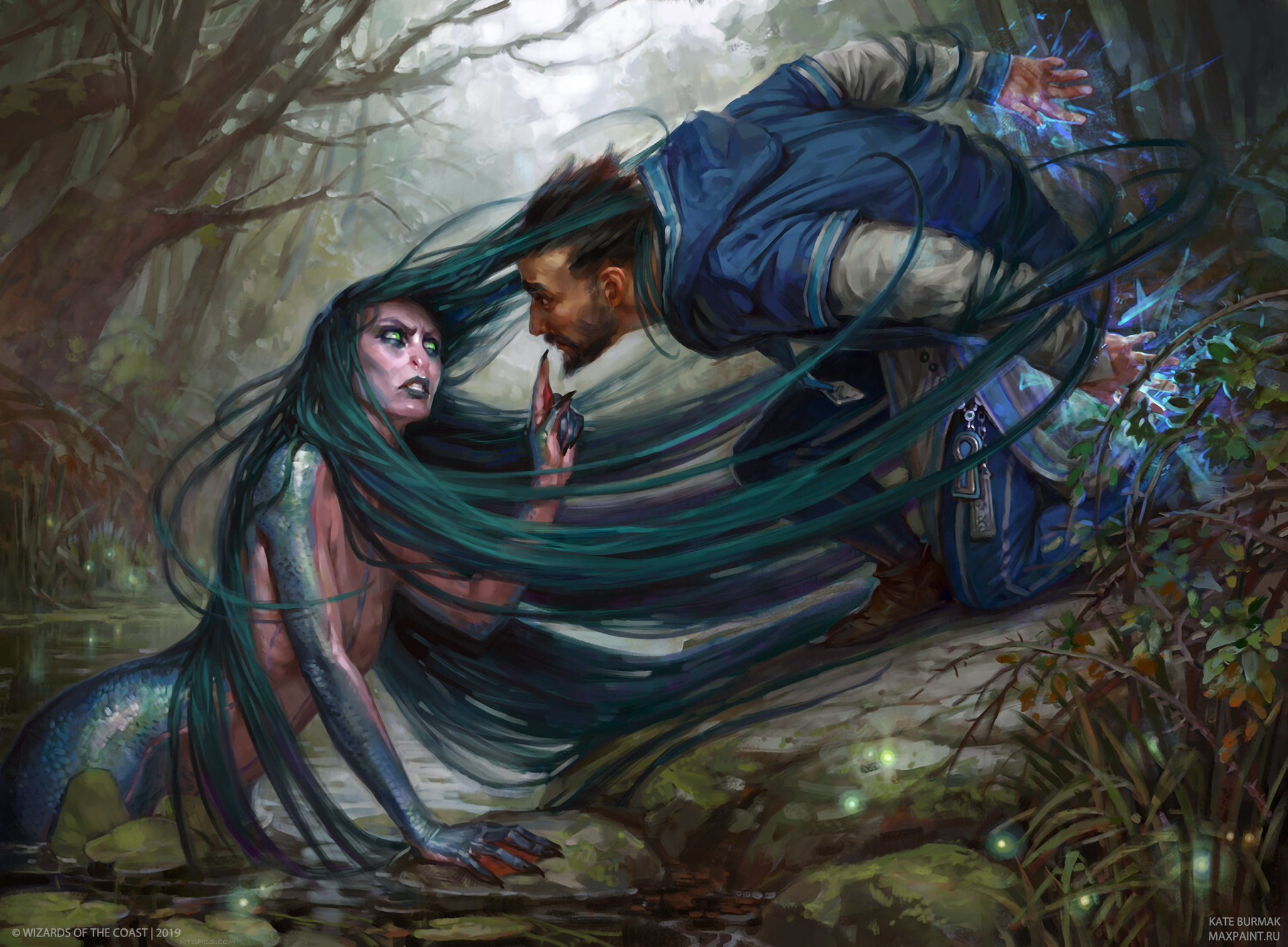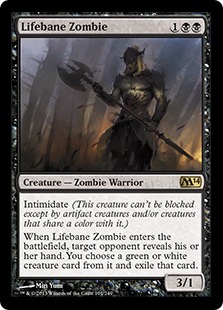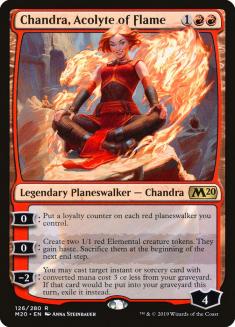Hello, and welcome back to Sullivan’s Satchel. I’m at a bit of an impasse on how to start this thing; usually there’s at least one thing going on to circle in on, and while Cedric’s demand that I re-assess my early Pioneer Kaldheim predictions is an affront to me, it’s hard to argue it has a wider effect than that.
People seem to love Time Spiral Remastered (can’t blame them, frames are cool) but sets that are a bunch of reprints don’t provide a lot of topics of conversation. It also doesn’t impact me much — can’t draft it in person because of COVID, can’t draft it on Magic Online (MTGO) because I no longer have an unlimited supply of Play Points via the Magic Online Advisory Board and so drafting has much greater opportunity cost. You may say, “Patrick, Magic is really fun, variety is the spice of life, and you’ve been stomping out people for the last month in Modern, surely you can indulge one draft with a bunch of cards you have nostalgia for,” and it is in that moment that you reveal that you do not understand me.
On that topic (not really a “topic” so much as an awkward pivot to something self-serving) I’ve been laying the lumber with the Prowess list that got published in last week’s Modern What We’d Play. Can’t say enough about it. It’s so good that I’ve gone about acquiring the physical cards in spite of not being permitted to play in tournaments with significant stakes and also being in the middle of a pandemic (including Bob Ross Mountains, completing my transition to Filthy Casual™).
I suggest giving it a try, especially since the deck is fairly affordable by Modern standards (a handful of fetches, Soul-Scar Mage, Mishra’s Bauble, not exactly the most expensive cards) and many of the marquee cards are good in other formats. The shell of the deck is likely to remain good so long as Chalice of the Void doesn’t become a significant format feature.
With that, the questions. As always, you can send yours in to [email protected] or DM me on Twitter @BasicMountain. Besides getting a chance to have your question answered in the column, one question is selected each week as The Question of the Week™ along with $25 in SCG credit. I’m getting a lot more questions since last week, probably as a function of moving to the Select side of the website, which means more competition for the prize but also means I no longer have to avail myself of the occasional ghost-written question, digging through the previous six months of emails for a hidden gem, posting spam emails as a joke, etc.
From Ranveer S:
I don’t think Magic will ever “go back to paper” insofar as that the highest levels of Organized Play will be primarily driven by paper Magic, but I don’t think of this is a binary. Rather, how do these systems synergize and interact? What is captured by physical play that digital can’t accomplish?
A few things pop to mind. The biggest — some players enjoy paper Magic far more than digital. It’s a different experience, and a more social one. You can’t just say “play on Arena” to everyone and expect them to get on board, and that demographic selects for people who spend a lot of money on sealed product, ancillary branded products, propping up the secondary market, etc.
Related — there’s a notion of “price memory” that comes into play here. When making the call to engage with either Arena or Magic Online, players need to make a call about if it’s “worth it.” Something that informs that decision is the cost of it versus the cost of other things, and the most similar comparison is to paper Magic. Everyone is going to have a different answer if, let’s say, $50 a month is “too much” to spend on Arena or an MTGO subscription, but if you’re used to spending $200 a month on paper Magic, getting the same amount of stuff for a fourth of the price is going to make it seem more reasonable, most likely.
That alone is enough to provide a lot of incentive to legitimize paper play, including at the highest levels. In addition, even if Wizards of the Coast (WotC) completely shifted away from physical Organized Play, plenty of parties (including Star City Games) have incentive to prop it up in their own capacity.
As usual, my ideal systems involve integrating these systems as much as possible, to make someone self-identify as a “competitive Magic player” rather than paper VS digital. I’m pretty interested in tournaments that feed from one platform to the other (Arena and MTGO already do plenty of this), and I think there’s room for even more creativity. As an idea, just off the cuff, imagine a GP-style event with the following rules:
- Day 1: Play up to nine rounds. Seven wins required to make Day 2. You stop playing once you get either your seventh win or third loss (maybe dropping after the third loss isn’t mandatory, you can play your rounds if you want, but you can’t Day 2).
- Day 2: All Day 2 competitors have their record reset (so 7-0 and 7-2 are the same record). Play X rounds based on attendance w/Top 8 cut, other prizes given out based on number of wins.
Would an Arena event three weeks before that gave, among other prizes, a pass straight to Day 2 be appealing? Is this tournament that much different/worse than a “regular” GP for the player who doesn’t play on Arena? Even in the older model, could you try running GP trials on the digital clients?
None of this is meant to imply that this is simple, or there aren’t a ton of externalities, factors I’m not considering, etc. I just think there’s enough incentive to promote all forms of competitive play just on monetization alone (they are different products that appeal to different people for different reasons, so as long as they aren’t in conflict things should be good), so it’s more a matter of ironing out the details than picking one thing over the other.
From Parth:
Lifebane Zombie kind of feels like an exception here, but it did have a very powerful spell like effect attached to an efficient body.
I generally prefer spells to creatures in this space, assuming you want the card to be impactful. I think Mystical Dispute is just about perfect — it doesn’t require an outlandishly out-of-balance world to consider putting it into your maindeck. It’s powerful in sideboard games, but because it’s a Mana Leak and therefore has a expiration date, it’s way more powerful for shoving through your own proactive thing rather than sitting on your heels forever, though it isn’t bad there either.
Most importantly, it does its thing and then everyone moves on with their lives. Mystical Dispute is powerful, sometimes game-determiningly so, but it isn’t on the table warping the entire game around it. I’m not sure if Timely Reinforcements or Kor Firewalker is more powerful in absolute terms but the latter is more obnoxious for the same set of reasons.
In short, if you want these color hosers to be powerful, I think they need to be one-and-done more than permanents that are hard to interact with, and spells do that way more reliably than creatures or enchantments.
Lifebane Zombie is somewhere in the middle. It’s a creature but you’re overpaying for the body, so the “spell” part is a lot of what’s going on. I dislike how easy it is for it to trade with a second card; I think the exact same card with “can’t block” added would solve any reservations I have about it.
From Peter Leja:
I really like planeswalkers. Giving people options is fun. Encouraging attacking and blocking is great, and giving attacking and blocking a third dimension (life total and managing the battlefield being the other two, though I suppose it’s a subsidiary of the latter) makes combat more dynamic than it would be otherwise.
Clearly not all planeswalkers are a success on this front. Teferi, Time Raveler is more about getting a rebate at a low cost (with an occasionally absurd ceiling) than it is about “combat,” and some designs (Oko, Thief of Crowns; Gideon Jura; etc.) are so broadly hostile to creatures that it’s foolish to regularly try to engage with them through combat. But if you’re going to make a ton of them, some of them are going to encroach on undesirable elements and as long as they’re managed with the appropriate rates, I think it’s okay.
My favorite planeswalker design of all time is probably Chandra, Acolyte of Flame. It’s not a superstar on rate so it doesn’t get played a lot (I think it’s a bit underplayed in Pioneer, for what it’s worth), but it encourages a bunch of different card types and play styles. The token stuff is good for going wide with other attackers or synergizing with anthems, the planeswalker callout obviously requires other planeswalkers, and then the minus asks for spells.
The token stuff leans aggressive, the spell stuff more defensive, and the planeswalker loyalty can toggle either or both ways depending on other cards you play. The card is multi-dimensional during deck construction and while on the battlefield and is about the least prescriptive set of incentives you can ask for, while not being unappealing or mutually exclusive.
I don’t know what specifically unexplored space I would like to see mined other than I think variety matters, so just do random designs every now and again for the sake of being different. I think the workmanlike “+1 draw a card, -3 kill something” five-loyalty designs are all well and good but there’s room for a lot more stuff, even if it isn’t powerful. I think WotC is doing a significantly better job on this front now than five or six years ago.
Lastly, the Question of the Week, and winner of $25 in SCG Credit, from the “one Guinness” guy:
I think this is unethical. Beating infinite life by clearing the board and your opponent decking, or Hive Mind, or through other means, is different. This seems like winning purely because of — I’d even say “by exploiting” — MTGO’s inability to fully implement paper loops. It has been gaining traction in the Amulet community as a way to beat Heliod.
Do we have an obligation to treat MTGO like paper, or do we play the program as presented to us? In this instance the latter option seems to incentivize the Heliod player spending a ton of time clicking Yes to gain life, and their ability to win increases as they spend more time doing so. Seems bad.
I think this is pretty plainly unethical and, like with many ethical issues, speaks to a coordination issue.
I think if all Magic players got to choose if things worked like they do in paper or as they do now, with the weird exploit you’re describing, the overwhelming majority of people would vote to fix it. However, no one has the agency to fix it, and in these micro-moments you’re “spewing value” or whatever by not leveraging the exploit, and so not only does it not get fixed, people indulge in it constantly.
I’m not sure where to draw the lines here. MTGO is different from physical Magic and plenty of stuff comes up as a function of the chess clock that isn’t analogous to anything in paper. Even if I strongly intuit that the Valakut thing described above is unethical, does that mean it’s unethical to take game actions that aren’t relevant with an opponent up against their clock? Is it unethical to not concede a game I’m 100% to lose with an opponent up against their clock?
Both of these examples are strict functions of the clock, but so is the Valakut thing, too — the only reason your opponent is shortcutting to 300 life is because of concerns about their own clock. I struggle to draw clean lines here, and so it’s hard for me to prescribe what “we” should do.
My ideal world would look something like how it gets resolved in paper — after establishing a loop, MTGO would ask you how many times you wanted to do that loop, your opponent would have an option to ask for priority at any point during the iterations, and then after N loops you were forced to take a different game action. That would essentially remove time considerations from things like Heliod + Spike Feeder, Conspicuous Snoop + Kiki-Jiki, Mirror Breaker, and a handful of other examples.
I’m not sure how laborious this would be to implement (my uniformed guess is “very”) but I don’t know how feasible it is to try to police it through collective pressure when so many issues surrounding MTGO clocks are in fuzzy ethical territory to begin with.




